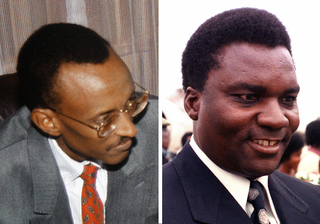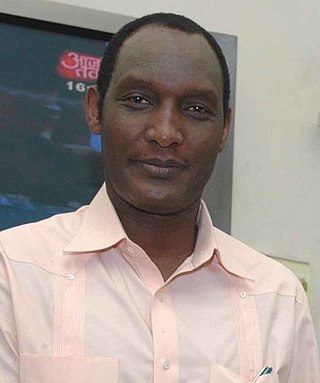Related Research Articles
Human occupation of Rwanda is thought to have begun shortly after the last ice age. By the 11th century, the inhabitants had organized into a number of kingdoms. In the 19th century, Mwami (king) Rwabugiri of the Kingdom of Rwanda conducted a decades-long process of military conquest and administrative consolidation that resulted in the kingdom coming to control most of what is now Rwanda. The colonial powers, Germany and Belgium, allied with the Rwandan court.

Juvénal Habyarimana was a Rwandan politician and military officer who served as the second president of Rwanda, from 1973 until his assassination in 1994. He was nicknamed Kinani, a Kinyarwanda word meaning "invincible".

Paul Kagame is a Rwandan politician and former military officer who has been the fourth President of Rwanda since 2000. He was previously a commander of the Rwandan Patriotic Front (RPF), a rebel armed force which invaded Rwanda in 1990. The RPF was one of the parties of the conflict during the Rwandan Civil War and the armed force which ended the Rwandan genocide. He was considered Rwanda's de facto leader when he was Vice President and Minister of Defence under President Pasteur Bizimungu from 1994 to 2000 after which the vice-presidential post was abolished.

The Rwandan Patriotic Front, is the ruling political party in Rwanda.

The Rwandan genocide, also known as the genocide against the Tutsi, occurred between 7 April and 19 July 1994 during the Rwandan Civil War. During this period of around 100 days, members of the Tutsi minority ethnic group, as well as some moderate Hutu and Twa, were killed by armed Hutu militias. Although the Constitution of Rwanda states that more than 1 million people perished in the genocide, the actual number of fatalities is unclear, and some estimates suggest that the real number killed was likely lower. The most widely accepted scholarly estimates are around 500,000 to 800,000 Tutsi deaths.

The Rwandan Civil War was a large-scale civil war in Rwanda which was fought between the Rwandan Armed Forces, representing the country's government, and the rebel Rwandan Patriotic Front (RPF) from 1 October 1990 to 18 July 1994. The war arose from the long-running dispute between the Hutu and Tutsi groups within the Rwandan population. A 1959–1962 revolution had replaced the Tutsi monarchy with a Hutu-led republic, forcing more than 336,000 Tutsi to seek refuge in neighbouring countries. A group of these refugees in Uganda founded the RPF which, under the leadership of Fred Rwigyema and Paul Kagame, became a battle-ready army by the late 1980s.

Fred Gisa Rwigema was a Rwandan politician and military officer. He was the founder of the Rwandan Patriotic Front (RPF), a political and military force formed by Rwandan Tutsi exile descendants of those forced to leave the country after the 1959 Hutu Revolution.

Human rights in Rwanda have been violated on a grand scale. The greatest violation is the Rwandan genocide of Tutsi in 1994. The post-genocide government is also responsible for grave violations of human rights.
Seth Sendashonga was the Minister of the Interior in the government of national unity in Rwanda, following the military victory of the Rwandan Patriotic Front (RPF) after the 1994 genocide. One of the politically moderate Hutus in the National Unity Cabinet, he became increasingly disenchanted with the RPF and was eventually forced from office in 1995 after criticizing government policies. After surviving a 1996 assassination attempt while in exile in Kenya, he launched a new opposition movement, the Forces de Résistance pour la Démocratie (FRD). Sendashonga was killed by unidentified gunmen in May 1998. The Rwandan government is widely believed to be responsible for the assassination.

Presidential elections were held in Rwanda on 9 August 2010, the second since the Rwandan Civil War. Incumbent President Paul Kagame of the Rwandan Patriotic Front (RPF) was re-elected for a second seven-year term with 93% of the vote.

Faustin Kayumba Nyamwasa is a Rwandan former Lieutenant general who formerly was the Chief of Staff of the Rwandan Army from 1998 to 2002. He was also head of Rwandan intelligence from 1998 to 2002 and served as Rwanda's ambassador to India between 2004 and 2010. Nyamwasa has been an opposition leader in exile since as part of the Rwanda National Congress.
The United Democratic Forces of Rwanda is a coalition of Rwandan opposition groups. Since its foundation in 2006, the UDF-Inkingi has profiled itself as an opposition party whose main objective is to change the regime of the Rwandan Patriotic Front (RPF), which has been in power since the end of the genocide against the Tutsis in July 1994. To this day, despite multiple attempts to become officially registered in Rwanda, the UDF-Inkingi has not yet been authorised to operate in Rwanda as a party. According to international human rights bodies, such as Human Rights Watch and Amnesty International, UDF-Inkingi members inside Rwanda have been regularly subjected to persecution and even to murder, mostly non-elucidated.
Jean-Léonard Rugambage was a Rwandan journalist, acting editor of the newspaper Umuvugizi. He was murdered after an assailant shot him four times in front of his home in Kigali on 24 June 2010.

Patrick Karegeya was a head of intelligence in Rwanda. He was a member of the Rwandan Patriotic Front (RPF) group that took power in Rwanda following the genocide and civil war. After becoming a critic of RPF leader Paul Kagame, he was stripped of his rank and jailed. Following a time in exile, he was assassinated in Johannesburg, South Africa on December 31, 2013.
Dr. Theogene Rudasingwa is a leading figure in the Rwanda National Congress and a former Chief of Staff to Rwandan President Paul Kagame (2000-2004), former General Secretary of the Rwandan ruling party, the Rwandan Patriotic Front (RPF), and former ambassador to the United States from 1996 to 1999. Rudasingwa has been in exile in the U.S. since 2004 after falling out with President Kagame, and was recently sentenced to 24 years in jail by a Rwandan court on charges that may have been politically motivated. Rudasingwa was born outside Rwanda and has lived most of his life outside the country.
Kizito Mihigo was a Rwandan gospel singer, songwriter, organist, composer of sacred music, television presenter, genocide survivor, peace maker and peace and reconciliation activist. Kizito was an iconic activist who dedicated his life to healing the souls of his fellow genocide survivors and rebuilding unity and reconciliation in Rwanda. According to Kisito's words, published on Kizitomihigo.com, he claimed, "The objective of my works is to console and strengthen the wounded hearts, singing peace and forgiveness." His ultimate performance in healing and Peacebuilding started in 2010 when he created the Kizito Mihigo Peace Foundation, a non-profit organization devoted to his cause.
Since the end of the Rwandan Civil War, many forms of censorship have been implemented in Rwanda.
Events in the year 2021 in Rwanda.
Abdallah Seif Bamporiki was a Rwandan politician, member of the Rwanda National Congress (RNC). On 22 February 2021, Bamporiki was killed in South Africa by two gunmen after being pulled from his vehicle.
The Bugesera invasion, also known as the Bloody Christmas, was a military attack which was conducted against Rwanda by Inyenzi rebels who aimed to overthrow the government in December 1963. The Inyenzi were a collection of ethnically Tutsi exiles who were affiliated with the Rwandan political party Union Nationale Rwandaise (UNAR), which had supported Rwanda's deposed Tutsi monarchy. The Inyenzi opposed Rwanda's transformation upon independence from Belgium into a state run by the ethnic Hutu majority through the Parti du Mouvement de l'Emancipation Hutu (PARMEHUTU), an anti-Tutsi political party led by President Grégoire Kayibanda. In late 1963, Inyenzi leaders decided to launch an invasion of Rwanda from their bases in neighbouring countries to overthrow Kayibanda. While an attempted assault in November was stopped by the government of Burundi, early in the morning on 21 December 1963, several hundred Inyenzi crossed the Burundian border and captured the Rwandan military in camp in Gako, Bugesera. Bolstered with seized arms and recruited locals, the Iyenzi—numbering between 1,000 and 7,000—marched on the Rwandan capital, Kigali. They were stopped 12 miles south of the city at Kanzenze Bridge along the Nyabarongo River by multiple units of the Garde Nationale Rwandaise (GNR). The GNR routed the rebels with their superior firepower, and in subsequent days repelled further Inyenzi attacks launched from the Republic of the Congo and Uganda.
References
- ↑ About Us Rwanda National Conference, 2010. Retrieved 4 January 2014.
- ↑ Exiled foes live in fear of Kagame by Donna Bryson, Associated Press, in The Washington Times , 26 January 2011. Retrieved 4 January 2014. Archived here.
- ↑ "Rwanda's opposition in diaspora disintegrating". The East African . 23 July 2016. Retrieved 8 January 2018.
- ↑ "A New RNC under Dr Theogene Rudasingwa". The Rwandan. 1 July 2016.
- ↑ "The New Rwanda National Congress's Declaration on Genocide against Rwandan Hutu". The Rwandan. 15 September 2016.
- ↑ "RWANDA NATIONAL CONGRESSE (RNC)-NEWLY ELECTED REPRESENTATIVES AT THE GLOBAL AND NATIONAL LEVELS". The Rwandan. 8 September 2016.
- ↑ Team, The Observer. "Uganda responds to Rwanda accusations". The Observer - Uganda. Retrieved 2019-03-28.
- ↑ "Uganda denies backing Rwandan rebels as tensions grow". Washington Post.
- ↑ "Rwandan Seif Bamporiki killed in South Africa". BBC News. BBC World News. 22 February 2021. Retrieved February 22, 2021.
- ↑ "Rwanda: Twagiramungu rejoint la plateforme MRCD". La Libre Afrique (in French). 2019-06-18. Retrieved 2022-06-05.